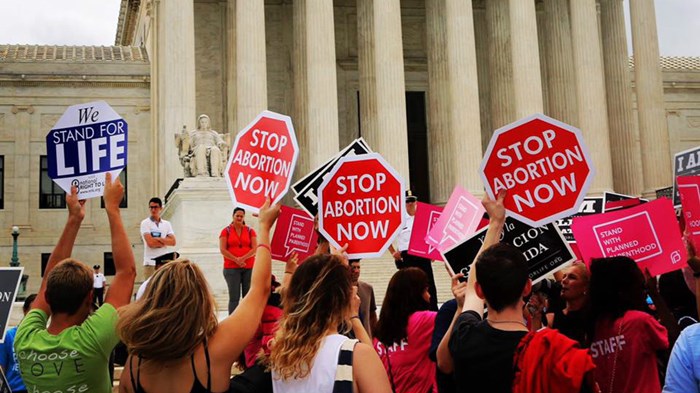
The Supreme Court sided with abortion providers in a landmark case today, striking down Texas’ stricter requirements for clinics and setting a potential precedent against similar regulations in other states.
Ruling on its first abortion case since 2007, the court voted 5-3 that the provisions of the 2013 Texas law known as HB-2 “place a substantial obstacle in the path of women seeking a previability abortion, constitute an undue burden on abortion access, and thus violate the Constitution.”
Justices Clarence Thomas, Samuel Alito, and Chief Justice John Roberts dissented.
This is the court’s first decision in more than 15 years to place limits on the record numbers of pro-life laws passed on the state level, Politicoreported.
The Texas law required abortion clinics to comply with the same requirements as outpatient surgery centers, and mandated that abortion doctors have admitting privileges at nearby hospitals.
Due to location, many were unable to meet the new standards. All but about 10 abortion providers would have been effectively shuttered, but the Supreme Court temporarily stopped Texas from enforcing the law when it accepted the case last year.
Pro-life advocates argued the new requirements made the procedure safer for women; the law was enacted after the grisly reports came out of Kermit Gosnell’s clinic in Pennsylvania. They blamed abortion providers’ opposition to the restrictions on greed and a disregard for women’s health.
Evangelical leaders and pro-life organizations including the National Right to Life, Americans United for Life, the Susan B. Anthony List, and Focus on the Family voiced their disappointment with the ruling.
“Abortion lobbyists win. They profit from women's pain & by refusing common-sense protections, put their bottom-line ahead of women's safety,” tweeted Charmaine Yoest, political commentator and former president of Americans United for Life. “This is a loss for women and a trampling of common sense.”
Russell Moore, president of the Ethics and Religious Liberty Commission, stated that the decision came “at the expense of children, women, and families” and offers “further proof of how much more work the pro-life movement has to do.”
The Whole Woman's Health v. Hellerstedt case was the High Court’s first decision on abortion since the death of Antonin Scalia in February. Justice Thomas’ dissent quotes the late justice:
[Today's] decision exemplifies the Court’s troubling tendency “to bend the rules when any effort to limit abortion, or even to speak in opposition to abortion, is at issue.”
The Texas ruling is expected to affect the fate of similar legislation currently facing court challenges. According to the Associated Press:
Separate lawsuits are pending over admitting-privileges laws in Louisiana and Mississippi, the other states covered by the 5th Circuit. The laws are on hold in both states, and a panel of federal appellate judges has concluded the Mississippi law probably is unconstitutional because it would force the only abortion clinic in the state to close.
A separate appeal is pending at the Supreme Court from Wisconsin, where federal judges have struck down that state's admitting privileges law.
The last time the justices decided a major abortion case was nine years ago when they ruled 5-4 to uphold a federal law banning a late-term abortion procedure.
Any Supreme Court ruling on abortion has political ramifications, particularly during an election year. Scalia’s empty chair puts on extra pressure. Obama has nominated Merrick Garland, who hasn’t taken a public stance on abortion. Republican members of the Senate Judiciary Committee said they wouldn’t hold hearings on any nominee until the next president was sworn in.
Democratic candidate Hillary Clinton cheered the Supreme Court’s decision, and pro-life voters continue to feel the pressure for a president who might shift the court. David French noted in the National Review last week that some evangelicals who side with Trump, despite his conflicting history on abortion, are “convinced that all of his faults are outweighed—just barely—by his (kinda sorta) promise to appoint conservative Supreme Court justices.”
CT previously noted the record clinic closures and that the number of abortions is the lowest it's been since Roe v. Wade. Despite unprecedented pro-life advances on the state level in the US, it was international delegations that recently led United Methodists to repeal four decades of pro-choice support and withdraw from the Religious Coalition for Reproductive Choice.

Support Our Work
Subscribe to CT for less than $4.25/month


















